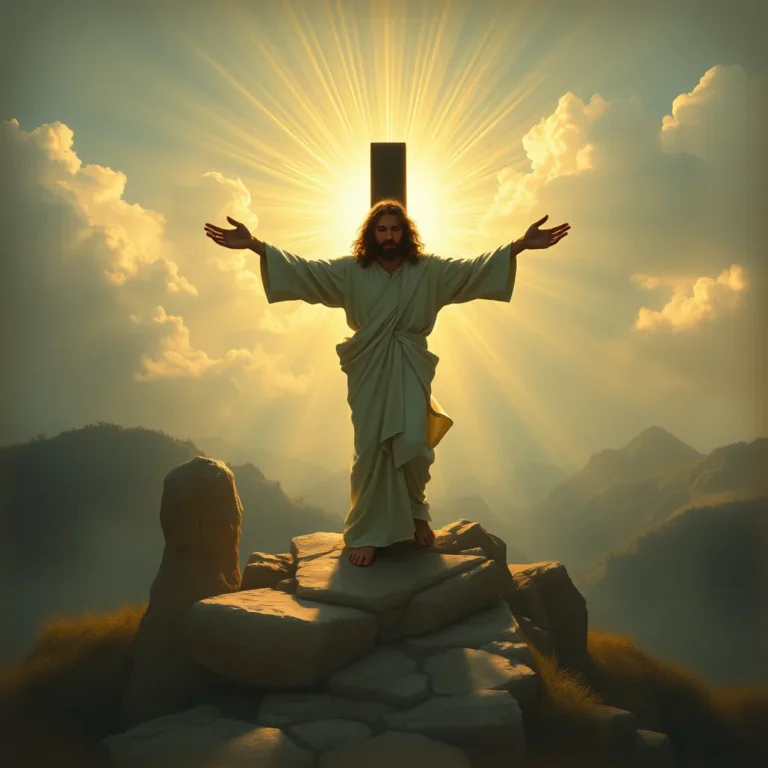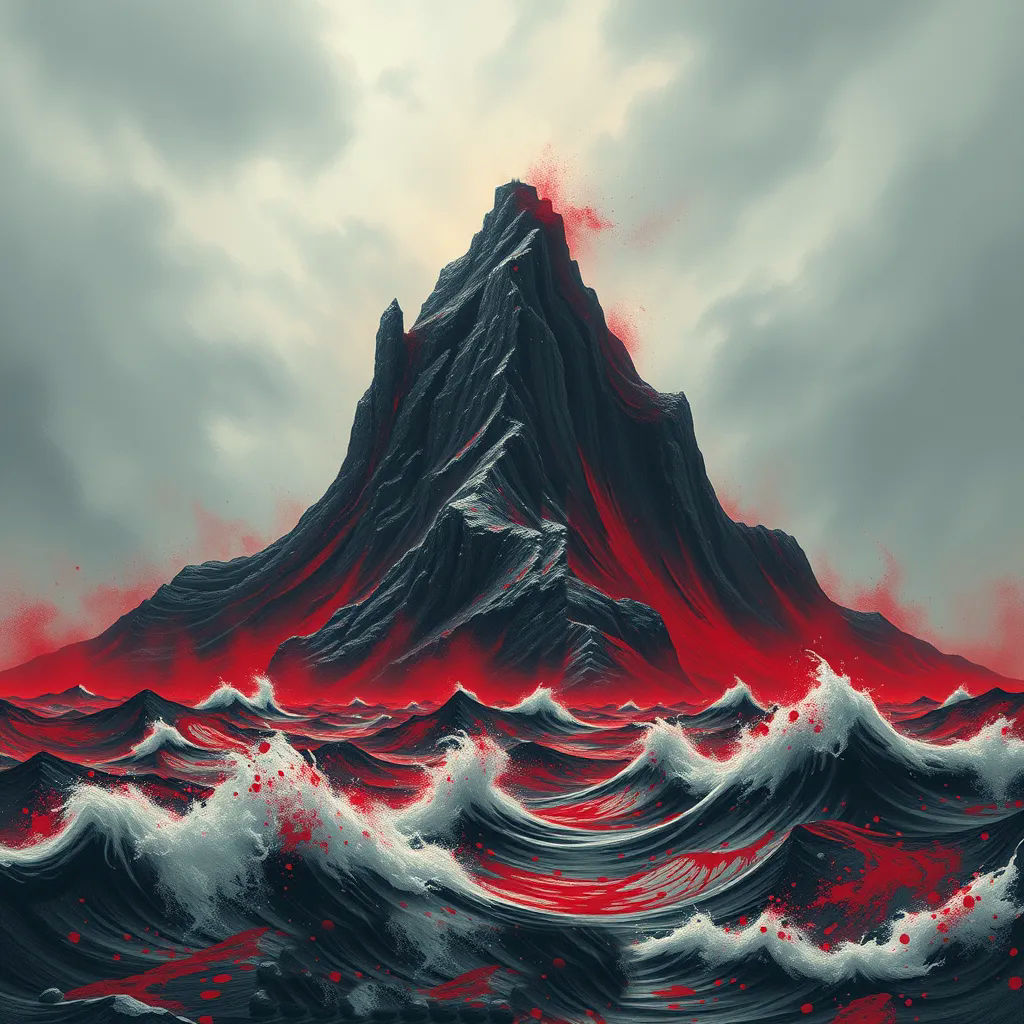
(*All Bible verses are from the NIV unless otherwise noted)
Chapter 8
6 Then the seven angels who had the seven trumpets prepared to sound them.
7 The first angel sounded his trumpet, and there came hail and fire mixed with blood, and it was hurled down on the earth. A third of the earth was burned up, a third of the trees were burned up, and all the green grass was burned up.
8 The second angel sounded his trumpet, and something like a huge mountain, all ablaze, was thrown into the sea. A third of the sea turned into blood,
9 a third of the living creatures in the sea died, and a third of the ships were destroyed.
Rev 8:7
The first angel sounded his trumpet, and there came hail and fire mixed with blood, and it was hurled down on the earth.
Note the resemblance of these images to the plagues that Moses called down on Egypt (Exod 8). Jews and Christians generally believe that Egypt’s plagues were literal disasters. As discussed earlier, it’s important to distinguish between literal circumstances and figurative language.
Compare the following verses:
Literal hail
“Have you entered the storehouses of the snow or seen the storehouses of the hail… (Job 38:22)
Figurative hail
The LORD will cause people to hear his majestic voice and will make them see his arm coming down with raging anger and consuming fire, with cloudburst, thunderstorm and hail. (Isaiah 30:30)
Literal fire
The priest shall then put on his linen clothes, with linen undergarments next to his body, and shall remove the ashes of the burnt offering that the fire has consumed on the altar and place them beside the altar. (Lev 6:10)
Figurative fire
See, the Name of the LORD comes from afar, with burning anger and dense Clouds of smoke; his lips are full of wrath, and his tongue is a consuming fire. (Isa 30:27)
Literal famine
Now there was a famine in the land, and Abram went down to Egypt to live there for a while because the famine was severe. (Gen 12:10)
Figurative famine
“The days are coming,” declares the Sovereign LORD, “when I will send a famine through the land— not a famine of food or a thirst for water, but a famine of hearing the words of the LORD. (Amos 8:11)
Literal earthquake
The words of Amos, one of the shepherds of Tekoa—the vision he saw concerning Israel two years before the earthquake, when Uzziah was king of Judah and Jeroboam son of Jehoash was king of Israel. (Amos 1:1)
Figurative earthquake
The mountains quake before him and the hills melt away. The earth trembles at his presence, the world and all who live in it. (Nah 1:5)
The Bible relates a few instances where the enemies of Israel were literally beaten down by hailstones and heavenly fire (e.g. Joshua 10:11, 2 Kings 1:10). But for the most part, Isaiah and other prophets were speaking figuratively, using the most powerful images available to their culture to describe the eventual fall of those nations and peoples who sought Israel’s annihilation.
John is using the same descriptive language to warn a rebellious earth of the consequences of rejecting God. It’s important to note that John’s vision isn’t simply a threat leveled at the pagan world. It’s a letter of warning – and comfort – to the saints of Asia Minor. Martyrdom and suffering are coming, but so is God’s deliverance. With every trumpet blast, it’s as if the Lord is declaring to Rome, the new Egypt – the new Babylon – “Let my children go!” The same message resonates for the Church at any age of history.
Rev 8:7
A third of the earth…trees…and all the green grass was burned up:
Once again, take note of symbolic references as opposed to literal ones:
Literal Amounts
1 Sam 13:21The price was two-thirds of a shekel for sharpening plow points and mattocks, and a third of a shekel for sharpening forks and axes and for re-pointing goads.
Num 28:14 With each bull there is to be a drink offering of half a hin of wine; with the ram, a third of a hin; and with each lamb, a quarter of a hin. This is the monthly burnt offering to be made at each new moon during the year.
Figurative Amounts
Ezek 5:11-12Therefore as surely as I live, declares the Sovereign LORD, because you have defiled my sanctuary with all your vile images and detestable practices, I myself will shave you; I will not look on you with pity or spare you. 12 A third of your people will die of the plague or perish by famine inside you; a third will fall by the sword outside your walls; and a third I will scatter to the winds and pursue with drawn sword.
Zech 13:8 In the whole land,” declares the LORD,“two-thirds will be struck down and perish;yet one-third will be left in it.
It’s unlikely that God neatly divides populations and nature into exact fractions to accomplish His plans. C.J. Ellicott observed that the expressions used in John’s vision are designed to remind us that even in Judgment, God remembers mercy; while He disciplines all, He does not utterly destroy all1.
Zech 13:8-9 This third I will put into the fire; I will refine them like silver and test them like gold. They will call on my name, and I will answer them; I will say, ‘They are my people,’ and they will say, ‘The LORD is our God.’ ”
Old Testament writers often compare the wicked to trees and grass that are blown this way and that but eventually die and wither away:
Ps 92:7 …that though the wicked spring up like grass and all evildoers flourish, they will be destroyed forever.
Ps 37:2 …for like the grass they will soon wither, like green plants they will soon die away.
Isa 2:12 The LORD Almighty has a day in store for all the proud and lofty, for all that is exalted (and they will be humbled), 13 for all the cedars of Lebanon, tall and lofty, and all the oaks of Bashan, 14 for all the towering mountains and all the high hills, 15 for every lofty tower and every fortified wall, 16 for every trading ship and every stately vessel. 17 The arrogance of man will be brought low and human pride humbled; the LORD alone will be exalted in that day,
Isa 40:6 A voice says, “Cry out.” And I said, “What shall I cry?” “All people are like grass, and all their faithfulness is like the flowers of the field. 7 The grass withers and the flowers fall, because the breath of the LORD blows on them. Surely the people are grass. 8 The grass withers and the flowers fall, but the word of our God endures forever.”
Amos 2:9 “Yet I destroyed the Amorites before them, though they were tall as the cedars and strong as the oaks. I destroyed their fruit above and their roots below.
(see also, Isa 37:27, 51:12, Ezek 15:6-7, Ezek 31, Psa 72:16)
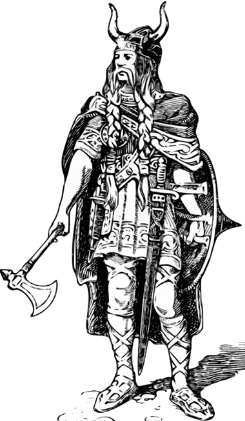
Throughout history, there have been numerous instances of human pride leading to eventual destruction. Jerusalem, led by men full of self-righteous arrogance and blind jealousy, was utterly destroyed. Rome was eventually humiliated by invading Germanic tribes who engulfed the once mighty empire. John’s prophecy not only foretold these events but also presented timeless principles. There will always be terrible consequences for those who choose evil over good.
Rev 8:8
The second angel sounded his trumpet, and something like a huge mountain, all ablaze, was thrown into the sea:
Isaiah prophesied against Babylon, the mighty empire that subdued and sacked Jerusalem and carried her people away into captivity (Isa 13). In rich metaphorical language, he condemns Babylon to the same fate to which she subjected others:
Isa 13:10-11 The stars of heaven and their constellations will not show their light. The rising sun will be darkened and the moon will not give its light. 11 I will punish the world for its evil, the wicked for their sins. I will put an end to the arrogance of the haughty and will humble the pride of the ruthless…13 Therefore I will make the heavens tremble; and the earth will shake from its place at the wrath of the LORD Almighty, in the day of his burning anger. 14 Like a hunted gazelle, like sheep without a shepherd, they will all return to their own people, they will flee to their native land.
Isaiah was prophesying that Babylon’s “rising sun” would be darkened; its “stars and moon” – its leaders and teachers – would no longer give light.
Jeremiah calls Babylon a “destroying mountain” and, in rich prophetic imagery, describes her eventual fate. Psalms and Job paint similar word pictures to proclaim the fate of all who stand against God:
Jer 51:24 24 “Before your eyes I will repay Babylon and all who live in Babylonia for all the wrong they have done in Zion,” declares the LORD. 25 “I am against you, you destroying mountain, you who destroy the whole earth,” declares the LORD. “I will stretch out my hand against you, roll you off the cliffs, and make you a burned-out mountain.
Job 9:5-7 5 He moves mountains without their knowing it and overturns them in his anger. 6 He shakes the earth from its place and makes its pillars tremble. 7 He speaks to the sun and it does not shine; he seals off the light of the stars.
Job 14:18-19 “But as a mountain erodes and crumble sand as a rock is moved from its place, 19as water wears away stones and torrents wash away the soil, so you destroy a person’s hope.
Psa 18:7-8 7 The earth trembled and quaked,and the foundations of the mountains shook;they trembled because he was angry. 8 Smoke rose from his nostrils;consuming fire came from his mouth,burning coals blazed out of it.
In contrast to these earthly mountains of power, explore references to God’s “holy mountain” in Psalms and the prophets. In biblical texts, “God’s holy mountain” often symbolizes a place of divine presence, worship, and sacred interaction between God and His people. Mount Zion, particularly in Psalms and prophetic writings, is frequently referenced as the dwelling place of God and the center of His kingdom—a spiritual symbol for divine authority, protection, and eternal peace:
Ps 3:4 I call out to the LORD, and he answers me from his holy mountain.
Isa 11:9 They will neither harm nor destroy on all my holy mountain, for the earth will be filled with the knowledge of the LORD as the waters cover the sea.
Ezek 20:40 For on my holy mountain, the high mountain of Israel, declares the Sovereign LORD, there in the land all the people of Israel will serve me, and there I will accept them. There I will require your offerings and your choice gifts, along with all your holy sacrifices.
Zech 8:3 This is what the LORD says: “I will return to Zion and dwell in Jerusalem. Then Jerusalem will be called the Faithful City, and the mountain of the LORD Almighty will be called the Holy Mountain.”
In both cases, the image of mountains is used to describe great bastions of power, both good and evil. In John’s day, the great “mountains” of power seeking to destroy the Church were the Jewish leaders and the Roman Empire:
John 11:48 If we let [Jesus] go on like this, everyone will believe in him, and then the Romans will come and take away both our temple and our nation.”
Acts 28:17 Three days later he called together the local Jewish leaders. When they had assembled, Paul said to them: “My brothers, although I have done nothing against our people or against the customs of our ancestors, I was arrested in Jerusalem and handed over to the Romans.
Acts 9:23 After many days had gone by, there was a conspiracy among the Jews to kill him,
Acts 13:45 When the Jews saw the crowds, they were filled with jealousy. They began to contradict what Paul was saying and heaped abuse on him.
John sees their “mountains,” “all ablaze,” and “thrown into the sea!” Further, John’s prophecy has seen fulfillment in the fall of countless nations and empires whose foundations were built on greed and cruelty.
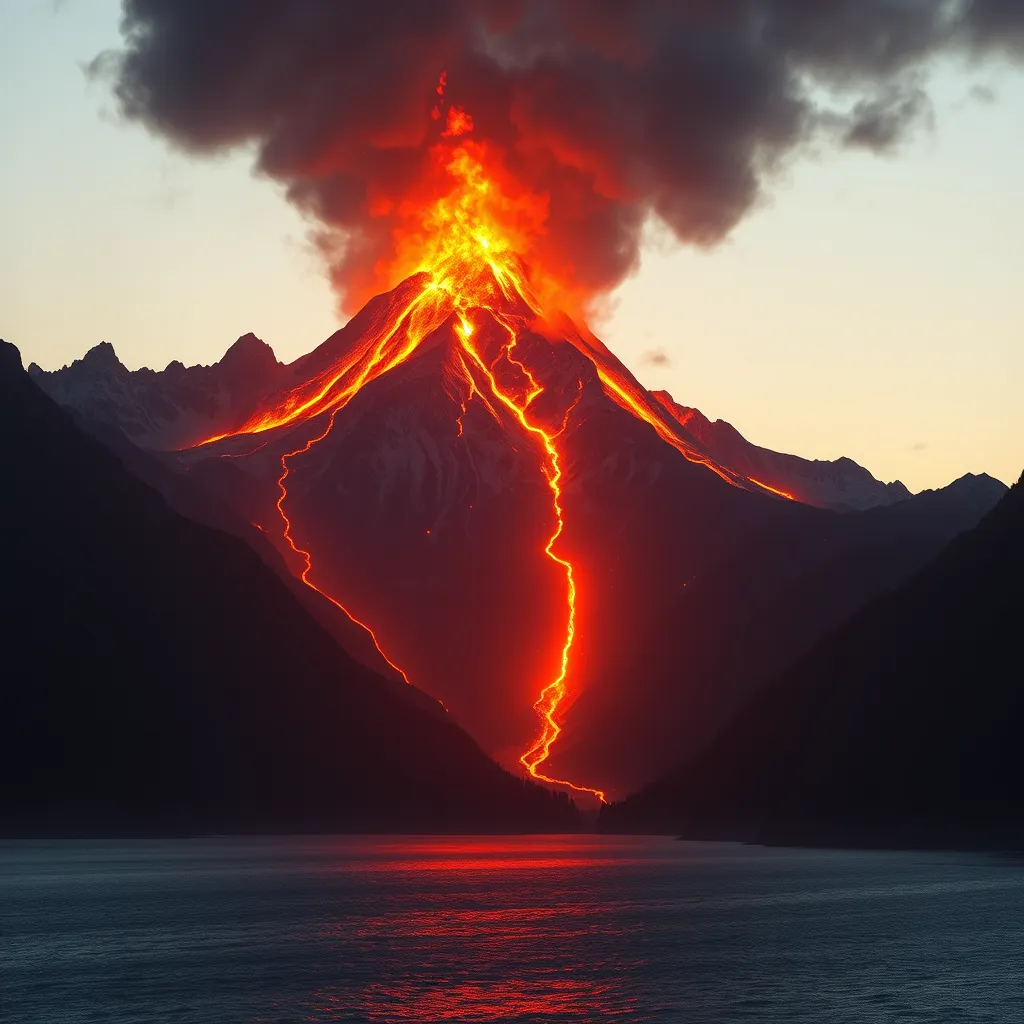
Rev 8:8-9
A third of the sea turned into blood, a third of the living creatures in the sea died, and a third of the ships were destroyed:
This is another allusion to the plagues on Egypt. Next to the cosmos itself, the seas were some of the widest expanses of space known. They held the greatest mysteries and fears and were often used to symbolize the infinite.
In the following verses, note how the image of the sea is used to illustrate the ebb and flow of nations, immense size, depth, and abundance:
Zech 10:11 They will pass through the sea of trouble;the surging sea will be subduedand all the depths of the Nile will dry up.Assyria’s pride will be brought downand Egypt’s scepter will pass away.
Micah 7:19 You will again have compassion on us;you will tread our sins underfootand hurl all our iniquities into the depths of the sea.
Psa 8:8 …the birds in the sky,and the fish in the sea,all that swim the paths of the seas.
Psa 104:24 How many are your works, LORD!In wisdom you made them all;the earth is full of your creatures. 25 There is the sea, vast and spacious, teeming with creatures beyond number—living things both large and small.
Rev 17:15 Then the angel said to me, “The waters you saw, where the prostitute sits, are peoples, multitudes, nations and languages.
As we saw in Chapter 4, the “sea” or “waters” often depict the multitudes of people on earth. “Blood can symbolize life, but it can also illustrate death and corruption. Given these symbols, consider what happens when “people” and “nations” figuratively turn into “blood,” when a great percentage of food and abundance die out, and when commerce, shipping, and transportation are destroyed!
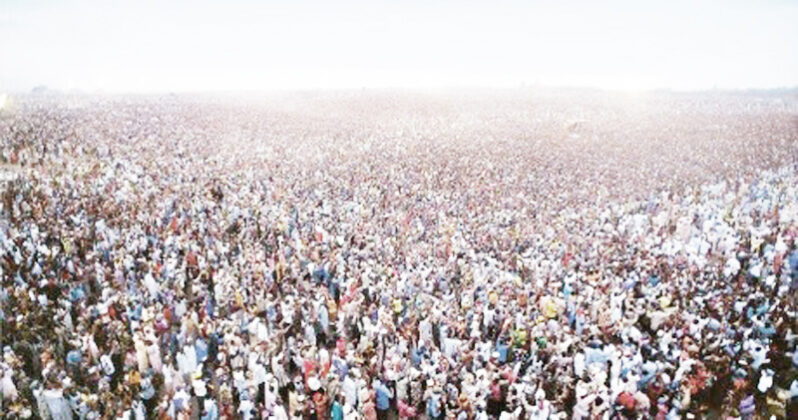
With the utter destruction of Jerusalem in 70 AD and the eventual collapse of the Roman Empire, commerce slowed to a fraction of its previous level. Cities fell into ruin. Famine, starvation, and lawlessness began to paralyze the known world, eventually leading to the “Dark Ages.”
Edward Gibbon wrote:
The decline of Rome was the natural and inevitable effect of immoderate greatness. Prosperity ripened the principle of decay; the causes of destruction multiplied with the extent of conquest; and as soon as time or accident had removed the artificial supports, the stupendous fabric yielded to the pressure of its own weight.2
Gibbon’s exhaustive history of the rise and fall of Rome describes an empire that grew by the sword and brutal conquest. His history begins with the overthrow of the Roman Kingdom, an event in ancient Rome that took place between the 6th and 5th centuries BC. A political revolution replaced the then-existing Roman monarchy under Lucius Tarquinius Superbus with a republic. Rome’s control rapidly expanded from the city’s immediate surroundings to control over the entire Mediterranean world.
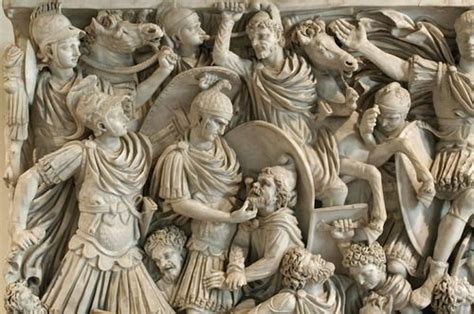
As the Empire expanded over the centuries, it became increasingly difficult to protect its borders. Invasions by Barbarian nations, themselves often pressed by invaders, were a constant threat. Over her long history, Rome’s hold over her border regions began to decay. In-fighting between generals and emperors, corrupt government, a failing economy, and a society too dependent on slave labor gradually weakened the empire.
External threats from invading tribes led to internal calamities, including corruption, wasteful spending, taxation, and hyperinflation, which further widened the breach between the wealthy and the poor. With a failing economy, commercial and agricultural production in deterioration, and constant war with Barbarian tribes, the Roman Empire started to lose its territories throughout Europe and North Africa. In 410 AD, Alaric of the Visigoths broke through Rome’s defenses and sacked the city. The Empire suffered invasions by the Vandals in 455, and finally, in 476, the last true Roman Emperor, Romulus Augustulus, was deposed by the Germanic leader Odoacer. Historians generally mark the year 476 as the fall of the Western Empire. From that point on, no Roman would again rule.
The history of Judea and Jerusalem was just as turbulent. By 66 AD the political climate in Jerusalem was fast deteriorating. A new Roman Governor, Gessius Florus, was openly hostile to the Jews, robbing the Temple and erecting statues of himself and Emperor Nero. The Roman historian Tacitus reported that Florus pushed the Jew’s patience to the breaking point. Although the leaders in Jerusalem knew that war with Rome could not be won, they chose that direction rather than continue under the terrible abuse from Florus3.
A faction of Jewish rebels stormed the Antonia Fortress, where the Roman soldiers were garrisoned, and killed all the Romans there. Rome sent legions to quash the rebellion. Rather than uniting to face the Romans, different Jewish factions began fighting each other for power. By the Spring of 70 AD, the city was split three ways. The Zealots held the Temple Mount.
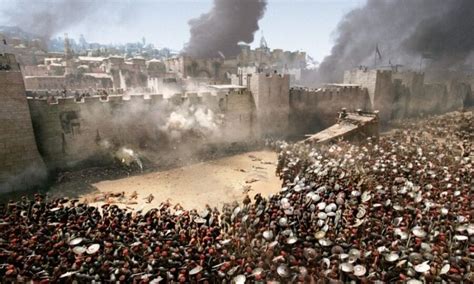
Another faction leader, Simon bar Giora, who controlled the Upper City, and Eleazar of the upper class, who controlled the Temple itself. These three competing factions continued to fight each other even as Titus and his Roman army besieged the city4.
Finally, Titus constructed a wooden wall around the city nearly five miles long with thirteen towers. Thus, all chances of escaping Jerusalem or foraging for food were ended, and the surrounding countryside was turned into a scorched wasteland.
On July 1, the wall of the Antonia fortress fell, and on July 5, all its defenders fled into the Temple Mount compound. On August 10, a Roman soldier threw a burning torch into the “Holy of Holies,” setting the giant tapestry on fire. The Romans began looting the Temple, and the slaughter began. After the fires died down, all the stones were pried up, and the entire Temple Mount was leveled to the foundations. Josephus reported that over one million Jews were killed, and 97,000 prisoners were taken. All walls and buildings were demolished except the foundation walls of the Temple Mount. The southwest portion of that wall still exists and is called the “Wailing Wall”.
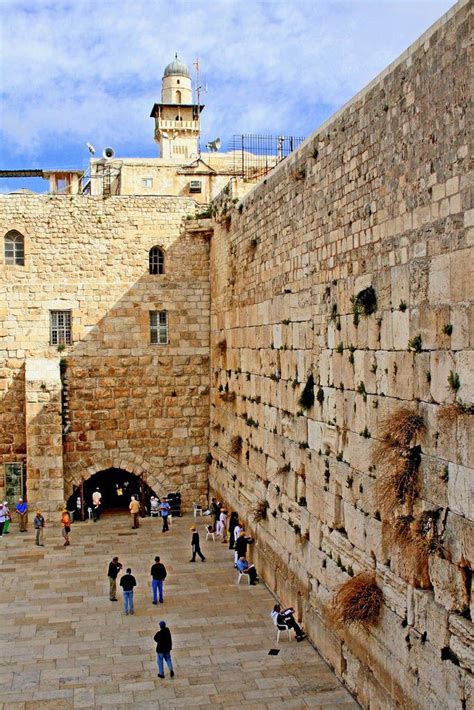
Josephus was an eye-witness to the carnage:
5 So the Romans being now become masters of the wars, they both placed their ensigns upon the towers, and made joyful acclamations for the victory they had gained, as having found the end of this war much lighter than its beginning; for when they had gotten upon the last was, without any bloodshed, they could hardly believe what they found to be true; but seeing nobody to oppose them, they stood in doubt what such an unusual solitude could mean. But when they went in numbers into the lanes of the city, with their swords drawn, they slew those whom they overtook, without mercy, and set fire to the houses wither the Jews were fled, and burnt every soul in them, and laid waste a great many of the rest; and when they were come to the houses to plunder them, they found in them entire families of dead men, and the upper rooms full of dead corpses, that is of such as died by the famine; they then stood in a horror at this sight, and went out without touching anything.
But although they had this commiseration for such as were destroyed in that manner, yet had they not the same for those that were still alive, but they ran every one through whom they met with, and obstructed the very lanes with their dead bodies, and made the whole city run down with blood, to such a degree indeed that the fire of many of the houses was quenched with these men’s blood.
…And truly so it happened, that though the slayers left off at the evening, yet did the fire greatly prevail in the night, and as all was burning, came that eighth day of the month Gorpieus [Elul] upon Jerusalem; a city that had been liable to so many miseries during the siege, that, had it always enjoyed as much happiness from its first foundation, it would certainly have been the envy of the world. Nor did it on any other account so much deserve these sore misfortunes, as by producing such a generation of men as were the occasions of this its overthrow. (Josephus, The Jewish Wars, Book 6, Chapter 8:5)
Footnotes
- Charles John Ellicott, Commentary for English Readers, Rev. 8:7. ↩︎
- Gibbons: History of the Decline and Fall of the Roman Empire, Vol. 3, chapter 38. ↩︎
- World History Encyclopedia, The Great Jewish Revolt of 66 CE, https://www.worldhistory.org/article/823/the-great-jewish-revolt-of-66-ce/, retrieved Feb. 4, 2024. ↩︎
- Jewish Virtual Library, Ancient Jewish History: The Great Revolt, 66 CE, https://www.jewishvirtuallibrary.org/the-great-revolt-66-70-ce, accessed Feb. 4, 2024. ↩︎
*All Scripture quotations, unless otherwise indicated, are taken from the Holy Bible, New International Version®, NIV®. Copyright ©1973, 1978, 1984, 2011 by Biblica, Inc.™ Used by permission of Zondervan. All rights reserved worldwide. www.zondervan.comThe “NIV” and “New International Version” are trademarks registered in the United States Patent and Trademark Office by Biblica, Inc.™




